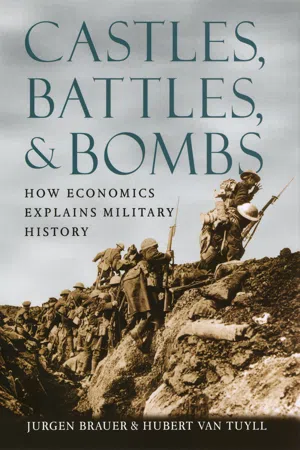
Castles, Battles, and Bombs
How Economics Explains Military History
- English
- ePUB (mobile friendly)
- Available on iOS & Android
About this book
Castles, Battles, and Bombs reconsiders key episodes of military history from the point of view of economics—with dramatically insightful results. For example, when looked at as a question of sheer cost, the building of castles in the High Middle Ages seems almost inevitable: though stunningly expensive, a strong castle was far cheaper to maintain than a standing army. The authors also reexamine the strategic bombing of Germany in World War II and provide new insights into France's decision to develop nuclear weapons. Drawing on these examples and more, Brauer and Van Tuyll suggest lessons for today's military, from counterterrorist strategy and military manpower planning to the use of private military companies in Afghanistan and Iraq.
"In bringing economics into assessments of military history, [the authors] also bring illumination. . . . [The authors] turn their interdisciplinary lens on the mercenary arrangements of Renaissance Italy; the wars of Marlborough, Frederick the Great, and Napoleon; Grant's campaigns in the Civil War; and the strategic bombings of World War II. The results are invariably stimulating."—Martin Walker, Wilson Quarterly
"This study is serious, creative, important. As an economist I am happy to see economics so professionally applied to illuminate major decisions in the history of warfare."—Thomas C. Schelling, Winner of the 2005 Nobel Prize in Economics
Frequently asked questions
- Essential is ideal for learners and professionals who enjoy exploring a wide range of subjects. Access the Essential Library with 800,000+ trusted titles and best-sellers across business, personal growth, and the humanities. Includes unlimited reading time and Standard Read Aloud voice.
- Complete: Perfect for advanced learners and researchers needing full, unrestricted access. Unlock 1.4M+ books across hundreds of subjects, including academic and specialized titles. The Complete Plan also includes advanced features like Premium Read Aloud and Research Assistant.
Please note we cannot support devices running on iOS 13 and Android 7 or earlier. Learn more about using the app.
Information
Table of contents
- Cover
- Copyright
- Title Page
- Other Works
- Dedication
- Contents
- List of Figures and Tables
- Preface
- One: Economics
- Two: The High Middle Ages, 1000–1300 The Case of the Medieval Castle and the Opportunity Cost of Warfare
- Three: The Renaissance, 1300–1600 The Case of the Condottieri and the Military Labor Market
- Four: The Age of Battle, 1618–1815 The Case of Costs, Benefits, and the Decision to Offer Battle
- Five: The Age of Revolution, 1789–1914 The Case of the American Civil War and the Economics of Information Asymmetry
- Six: The Age of the World Wars, 1914–1945 The Case of Diminishing Marginal Returns to the Strategic Bombing of Germany in World War II
- Seven: The Age of the Cold War, 1945–1991 The Case of Capital-Labor Substitution and France’s Force de Frappe
- Eight: Economics and Military History in the Twenty-first Century
- Notes
- References
- Index